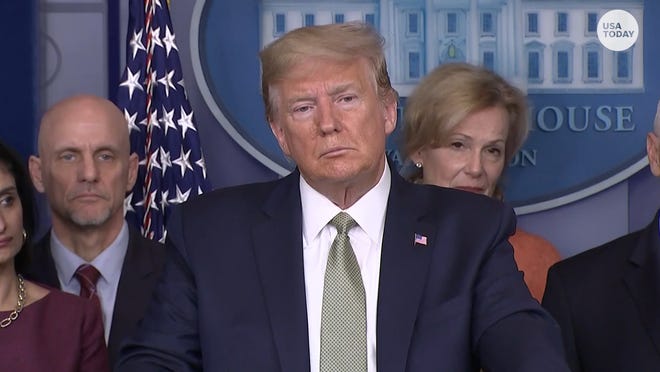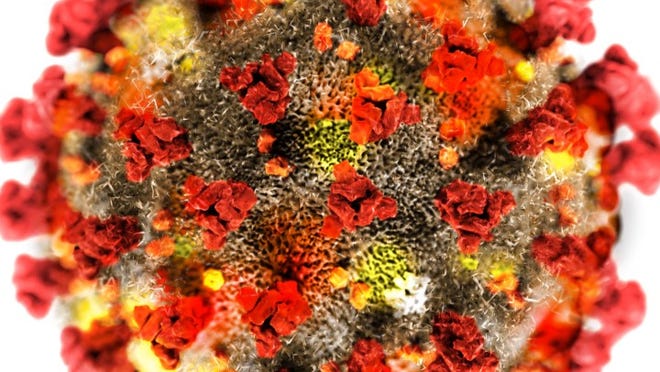Nina Lakhani, The Guardian•March 22, 2020

Photograph: Gregory Bull/AP
The Trump administration is ramping up construction of its multibillion-dollar southern border wall, despite the rapidly escalating coronavirus epidemic which threatens to kill thousands of Americans and plunge the country into economic recession.
Earlier this week, Customs and Border Protection (CBP) announced plans to erect more than 150 miles of the 30ft border wall in Arizona, New Mexico and California – in addition to ongoing construction work at at least 15 sites across those states and Texas.
The announcement came shortly after Donald Trump declared a national emergency, amid mounting criticism about his handling of the coronavirus epidemic which looks likely to cost billions – if not trillions of dollars to tackle.
By Friday 19,500 cases and 260 deaths had been confirmed in the US, and tens of thousands of sacked workers had applied for unemployment benefits, as large swaths of the country implemented lockdowns in efforts to slow the spread.
- ADVERTISEMENT -
As medical experts and local officials implore Americans to stay at home and observe social distancing, construction crews at multiple sites continue to work, sleep and eat in close quarters.
“Wall construction has not been affected,” said a CBP spokesman.
Building work continues in many parts of the country, but for the wall, skilled welders, engineers and contractors commute from states as far flung as Montana, Maine, Wyoming, Texas, North Dakota and Kentucky. Along the border, they work together, car-pool, stay at local hotels and motels, and eat together at restaurants over several consecutive days, before traveling back to their families.
On Friday, work continued in the San Bernardino Valley in south-east Arizona where a national wildlife refuge is located and several endangered species are threatened by the project.
“There is no sign of construction slowing down, hundreds of construction workers from all over the country and Mexico continue working on the wall, commuting back and forth on weekends, staying in hotels and eating at restaurants in our communities, before returning home and potentially transferring Covid-19. This is a public health hazard and it needs to be stopped,” said Myles Traphagen, ecologist with Wildlands Network, who has written to the congressional appropriations committee urging construction be suspended during the pandemic.
The army corp of engineers did not respond to questions about whether mitigation and prevention measures had been implemented.
Trump promised to build a “big, beautiful wall” along the 2,000-mile southern border (and make Mexico pay for it) as part of a presidential campaign permeated by anti-immigration sentiments.
Since then, the Trump administration has pledged to erect or replace 450 to 500 miles of the wall by the end of 2020, at a cost of almost $18.5bn. The vast majority of the money was diverted from the US Department of Defense, specifically from counter-drug operations and military infrastructure projects, after Trump declared a national emergency, widely seen as spurious, in February 2019 to fund the wall.
The latest planned additions to the piecemeal wall construction come after the Department of Homeland Security (DHS), which oversees CBP, waived a series of federal laws to speed up construction.
In order to erect the 30ft-high steel barrier as fast as possible, the Guardian has received reports of workers being paid above average rates to work through the night.
“The DHS is throwing billions at a monument out in the desert that will have little practical effect on migration or drug trafficking, when there’s a very real threat that needs all of our attention and resources right now,” said Adam Isacson, director of the defence oversight program at the Washington Office on Latin America (Wola). “This gives the impression that our government is on autopilot, throwing up big pharaonic, politicized projects, when right now we should be putting everything into rapid response.”
There are widespread shortages in testing kits and essential protective equipment like masks, gowns and gloves, while medical experts warn of insufficient ventilators and hospital beds to cope with the inevitable surge in sick patients.
On Friday, the secretary of state, Mike Pompeo, announced that the Mexico-US border would be close to all non-essential travel.
“It’s callous, dangerous and unacceptable for border wall construction to continue,” said Laiken Jordahl, borderlands campaigner at the Center for Biological Diversity. “Every government resource should be dedicated to saving lives and tackling this existential threat, rather than pulling out all the stops to make good on an election promise.”
The Trump administration is ramping up construction of its multibillion-dollar southern border wall, despite the rapidly escalating coronavirus epidemic which threatens to kill thousands of Americans and plunge the country into economic recession.
Earlier this week, Customs and Border Protection (CBP) announced plans to erect more than 150 miles of the 30ft border wall in Arizona, New Mexico and California – in addition to ongoing construction work at at least 15 sites across those states and Texas.
The announcement came shortly after Donald Trump declared a national emergency, amid mounting criticism about his handling of the coronavirus epidemic which looks likely to cost billions – if not trillions of dollars to tackle.
By Friday 19,500 cases and 260 deaths had been confirmed in the US, and tens of thousands of sacked workers had applied for unemployment benefits, as large swaths of the country implemented lockdowns in efforts to slow the spread.
- ADVERTISEMENT -
As medical experts and local officials implore Americans to stay at home and observe social distancing, construction crews at multiple sites continue to work, sleep and eat in close quarters.
“Wall construction has not been affected,” said a CBP spokesman.
Building work continues in many parts of the country, but for the wall, skilled welders, engineers and contractors commute from states as far flung as Montana, Maine, Wyoming, Texas, North Dakota and Kentucky. Along the border, they work together, car-pool, stay at local hotels and motels, and eat together at restaurants over several consecutive days, before traveling back to their families.
On Friday, work continued in the San Bernardino Valley in south-east Arizona where a national wildlife refuge is located and several endangered species are threatened by the project.
“There is no sign of construction slowing down, hundreds of construction workers from all over the country and Mexico continue working on the wall, commuting back and forth on weekends, staying in hotels and eating at restaurants in our communities, before returning home and potentially transferring Covid-19. This is a public health hazard and it needs to be stopped,” said Myles Traphagen, ecologist with Wildlands Network, who has written to the congressional appropriations committee urging construction be suspended during the pandemic.
The army corp of engineers did not respond to questions about whether mitigation and prevention measures had been implemented.
Trump promised to build a “big, beautiful wall” along the 2,000-mile southern border (and make Mexico pay for it) as part of a presidential campaign permeated by anti-immigration sentiments.
Since then, the Trump administration has pledged to erect or replace 450 to 500 miles of the wall by the end of 2020, at a cost of almost $18.5bn. The vast majority of the money was diverted from the US Department of Defense, specifically from counter-drug operations and military infrastructure projects, after Trump declared a national emergency, widely seen as spurious, in February 2019 to fund the wall.
The latest planned additions to the piecemeal wall construction come after the Department of Homeland Security (DHS), which oversees CBP, waived a series of federal laws to speed up construction.
In order to erect the 30ft-high steel barrier as fast as possible, the Guardian has received reports of workers being paid above average rates to work through the night.
“The DHS is throwing billions at a monument out in the desert that will have little practical effect on migration or drug trafficking, when there’s a very real threat that needs all of our attention and resources right now,” said Adam Isacson, director of the defence oversight program at the Washington Office on Latin America (Wola). “This gives the impression that our government is on autopilot, throwing up big pharaonic, politicized projects, when right now we should be putting everything into rapid response.”
There are widespread shortages in testing kits and essential protective equipment like masks, gowns and gloves, while medical experts warn of insufficient ventilators and hospital beds to cope with the inevitable surge in sick patients.
On Friday, the secretary of state, Mike Pompeo, announced that the Mexico-US border would be close to all non-essential travel.
“It’s callous, dangerous and unacceptable for border wall construction to continue,” said Laiken Jordahl, borderlands campaigner at the Center for Biological Diversity. “Every government resource should be dedicated to saving lives and tackling this existential threat, rather than pulling out all the stops to make good on an election promise.”




















